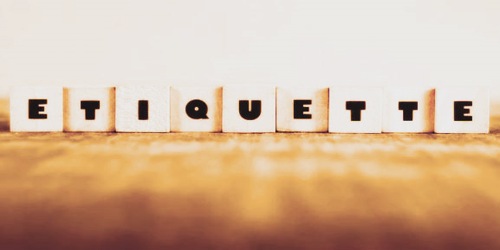Etiquette (French: e.ti.kɛt) in simpler words is defined as good behavior which distinguishes human beings from animals. Human Being is a social animal and it is really important for him to behave in an appropriate way. Etiquette refers to behaving in a socially responsible way. In modern English usage, the French word étiquette (ticket) dates from the year 1750.
It is the set of conventional rules of personal behavior in polite society, usually in the form of an ethical code that delineates the expected and accepted social behaviors that accord with the conventions and norms observed by a society, a social class, or a social group. It helps us show respect and consideration to others and makes others glad that we are with them. Without proper manners and etiquette, the customs of polite society would soon disappear and we would act more like animals and less like people. Aggressiveness and an “every man for himself” attitude would take the lead.
In earlier times, the rules of etiquette were used for two purposes: to remind people of their own status within society and to reinforce certain restrictions on individuals within that society.
In the Middle Ages and the Renaissance, for instance, etiquette dictated everything from how low a person of inferior rank had to bow to a person of higher rank to how long a man had to spend courting a woman before the two could marry.
In the 3rd millennium BC, the Ancient Egyptian vizier Ptahhotep wrote The Maxims of Ptahhotep (2375–2350 BC), a book of didactic precepts extolling civil virtues, such as truthfulness, self-control, and kindness towards other people. Recurrent thematic motifs in the maxims include learning by listening to other people, and that being mindful of the imperfection of human knowledge, avoiding open conflict, wherever possible, should not be considered weakness; and that the pursuit of justice should be foremost, yet acknowledged that, in human affairs, the command of a god ultimately prevails in all matters. Some maxims indicate a person’s correct behaviors in the presence of great personages (political, military, religious). Instructions on how to choose the right master and how to serve him. Other maxims teach the correct way to be a leader, through openness and kindness, and that greed is the base of all evil, and should be guarded against, and that generosity towards family and friends is praiseworthy.
Types of Etiquette:
- Social Etiquette – Social etiquette is important for an individual as it teaches him how to behave in the society.
- Bathroom Etiquette – Bathroom etiquette refers to the set of rules which an individual needs to follow while using public restrooms or office toilets. Make sure you leave the restroom clean and tidy for the other person.
- Corporate Etiquette – Corporate Etiquette refers to how an individual should behave while he is at work. Each one needs to maintain the decorum of the organization. Don’t loiter around unnecessary or peep into other’s cubicles.
- Wedding Etiquette – Wedding is a special event in every one’s life. Individuals should ensure they behave sensibly at weddings. Never be late to weddings or drink uncontrollably.
- Meeting Etiquette – Meeting Etiquette refers to styles one need to adopt when he is attending any meeting, seminar, presentation and so on. Listen to what the other person has to say. Never enter meeting room without a notepad and pen. It is important to jot down important points for future reference.
- Telephone Etiquette – It is essential to learn how one should interact with the other person over the phone. Telephone etiquette refers to the way an individual should speak on the phone. Never put the other person on long holds. Make sure you greet the other person. Take care of your pitch and tone.
- Eating Etiquette – Individuals must follow certain decorum while eating in public. Don’t make noise while eating. One should not leave the table unless and until everyone has finished eating.
- Business Etiquette – Business Etiquette includes ways to conduct a certain business. Don’t ever cheat customers. It is simply unethical.
In the 19th century, Victorian era (1837-1901) etiquette had developed into a complicated system of codified behaviors, which governed the range of manners in society from the proper language, style, and method for writing letters, to correctly using cutlery at table, and to the minute regulation of social relations and personal interactions between men and women and among the social classes.
Etiquette refers to guidelines which control the way a responsible individual should behave in the society.
Need for Etiquette:
- Etiquette makes you a cultured individual who leaves his mark wherever he goes.
- Etiquette teaches you the way to talk, walk and most importantly behave in the society.
- Etiquette is essential for an everlasting first impression. The way you interact with your superiors, parents, fellow workers, friends speak a lot about your personality and up-bringing.
- Etiquette enables the individuals to earn respect and appreciation in the society. No one would feel like talking to a person who does not know how to speak or behave in the society. Etiquette inculcates a feeling of trust and loyalty in the individuals. One becomes more responsible and mature. Etiquette helps individuals to value relationships.
Over the centuries, as society has become more democratic, etiquette has become an excellent combination of good manners, common sense, and rules of conduct that reflect cultural norms and the rules of our society as a whole rather than just one distinct group within it. It has less to do with the fashion of the moment or who is in power and more to do with putting others at ease and an ethical code of conduct.
Information Sources:
















